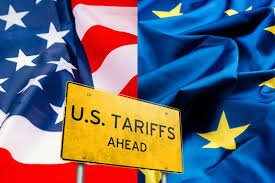In response to the United States’ recent imposition of tariffs on steel and aluminum imports, the European Union (EU) has unveiled a robust plan to retaliate, signaling escalating trade tensions between the two economic powerhouses. The latest US tariffs on Europe have prompted the EU to take decisive action to protect its economic interests.
EU’s Preparedness to Counter US Tariffs
European Commission President Ursula von der Leyen emphasized the EU’s readiness to respond decisively if negotiations with the U.S. fail to yield a satisfactory resolution. She stated, “We have a strong plan to take retaliatory measures,” highlighting the EU’s commitment to defending its member states’ economies. While the EU prefers dialogue over confrontation, it stands prepared to implement countermeasures to mitigate the impact of US tariffs on Europe.
Details of the EU’s Retaliatory Measures
The EU’s countermeasures are structured in two phases:
- Phase One: Reinstating tariffs originally imposed in response to previous U.S. metal tariffs. These measures, valued at €6.3 billion in 2018 but adjusted to €4.5 billion in 2025 due to changes in trade dynamics, were initially suspended following negotiations with the prior U.S. administration.
- Phase Two: Introducing additional tariffs targeting €18 billion worth of U.S. industrial and agricultural goods, including steel, aluminum, home appliances, wood products, poultry, beef, and other food imports.
These steps underscore the EU’s strategic approach to safeguarding its economic interests amidst evolving international trade policies and the repercussions of US tariffs on Europe.
Global Implications and Market Reactions
The announcement of these retaliatory measures has introduced uncertainty into global markets, with investors expressing concerns over a potential trade war between the U.S. and the EU. Economic analysts warn that escalating tariffs could disrupt supply chains, increase consumer prices, and dampen economic growth on both sides of the Atlantic. The EU’s assertive stance reflects its determination to uphold the principles of free and fair trade, even as it navigates complex geopolitical dynamics surrounding US tariffs on Europe.
Conclusion
As the situation develops, stakeholders worldwide are closely monitoring the interactions between the U.S. and the EU. The EU’s readiness to implement countermeasures highlights the intricate balance of international trade relations and the importance of constructive dialogue to resolve disputes. The coming weeks will be pivotal in determining whether these tensions escalate into a full-fledged trade conflict or pave the way for renewed negotiations aimed at achieving mutually beneficial outcomes.

